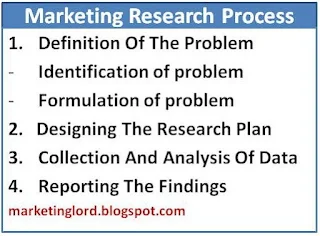Introduction
For reliable results it is highly essential that the marketing research be objective and systematic. Marketing research undergoes through the following four stage process which includes several activities related to planning, implementing, monitoring, managing and bringing the end product of the research in the form of report.
Stage 1: Identification And Definition Of The Problem
Definition of the problem is the first step towards finding a solution. Definition of the problem involves two major activities: identification of the problem, and formulation of the problem.
i. Identification of the problem
The first sign of a problem is usually a departure from normal function such as failures in attaining targets and objectives. For instance, if the organization achieved only 6% growth on sales instead of the targeted 12%, then a problem exists in the organization's sales.
ii. Formulation of the problem
This stage of marketing research involves refining the problem and describing the relevant situation and environment of the problem. In this stage researcher formulates the research objectives and prepares statement of hypothesis. There should be a full understanding between the marketing manager and the researcher as to the precise objectives of the research. Formulation of research objectives involves a joint exercise between the marketing manager and the researcher in order to finalize the objectives of the research. Statement of the objectives should be a specific, measurable and precise. A hypothesis is a guess or an assumption about certain phenomena, events, or relationships. Hypothesis is based on theories, principles and past knowledge available about the problem. The problem can be understood from exploratory research, previous research studies and past experience. The researcher can empirically verify the hypothesis in order to arrive at some conclusions.
Stage 2: Designing The Research Plan
This stage of marketing research process requires the researcher to determine the research plan. This is the most crucial stage in the research process. Therefore, the researcher needs to undergo maximum consultation in order to arrive at a foolproof research plan.In this stage, the researcher first needs to identify the availability of data in the marketing information system and evaluate its relevancy and adequacy to solve the problem at hand. If the data in the system is inadequate or irrelevant, he/she should plan for collection of additional data. This stage requires the researcher to formulate the research design for the marketing research project. Here the researcher has to determine answers to the following issues:
- Exploratory vs. conclusive research design
- Interviewing methods
- Large-scale vs. small-scale survey
- Selection of sample
- Preparing data-gathering instrument
After designing data collection instruments, the researcher has to collect data in the field situation. This stage requires the involvement of several people as interviewers, supervisors, field officers etc. this stage requires the careful monitoring, supervision and management of the people involved in the data collection process.
After the completed questionnaires are received, the researcher has to process the raw data. The processing involves editing the questionnaires, coding, entering into the computer and tabulating data for analysis.
The editing process is essential to ensure that the collected data are legible, logical, complete, and constant. Coding is required to assign the responses into categories so that they can be easily entered into a computer for generation of tables. The researcher has to use different statistical tools to receive statistical characteristics of the frequency tables. The data are analyzed on the basis of their characteristics from which the researcher can draw inferences.
Also Read
Stage4: Reporting The Findings
The end product of a marketing research is the research report. The report contains detailed descriptions of all the activities undertaken in course of the research, including the purpose of the research, research methodology followed, and the major findings of the research. Although the style of reporting varies according to the nature of the research and the requirements of the client, marketing research report should contain three parts; a brief executive summary, major findings, and tabulations.







